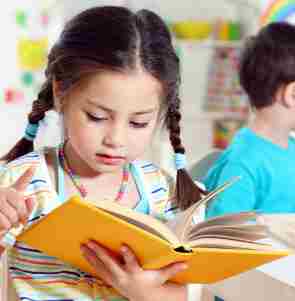Reading helps your child
- Varsha Prasad
Editorial Team
As the famous proverb says, 'Reading is to the mind what exercise is to the body', reading books ais a mental stimulation, an exercise that keeps the brain stress free. Reading is a habit that never leaves us. An avid reader understands how it feels to get glued to an interesting book.
The advantages
A person who reads books has a lot of advantages and some of them are,
- Better creativity and imagination
- Sharp analytical skills
- Better concentration and focus
- Improved communication and writing skills
- Enhanced vocabulary &
- Mental relaxation
 Reading to a baby
Reading to a babyReading to a baby has maximum effects. Though the baby doesn't understand what is being read, the activity of reading out loud becomes important. Few studies show that reading out loud helps the child learn and understand words and language faster.
Reading out loud also teaches the baby to communicate, learn alphabets, numbers, shapes, colours and concepts better. It inculcated concentration, vocabulary and better listening skills.
Helping a resistant children read
Everyone does not enjoy reading. Reading is a habit that has to be cultivated. While one child enjoys reading anything or everything, the other might not be willing to read. The habit has to be induced by the parents at home and teachers at schools. Reading does not have to be serious. It can start with reading a comic, a riddle book or even a few lines in a newspaper. As followed for babies, books can be read out loud by the parent or teacher for the kids to listen and gradually the responsibility can be passed on to the child, where he/she will read a page each from his/her favourite book.
The child can be made to read billboards and hoardings while driving to school, activities in schools can be practiced where the child is made to read the bulletin boards.
What to read?
- Babies enjoy anything you read to them, as long as the book you have in hand is colourful and has attractive images. But a child in preschool will enjoy anything that tells a story. Books that complement the story with pictures are preferred. The book can be a novel, a book of jokes or a book of activities. The parent should start giving the child books with the topics that interest the child. For example, if the child enjoys stories on fairies and fictional characters, a fictional novel with simple words will catch the child's attention. Similarly, if the child enjoys animals and plants, a book of simple facts or stories revolving around these can be given. Kids can read kids magazines
- audio books
- postcards, e-mails, and text messages from relatives
- photo albums or scrapbooks
- newspapers
- comic books
- the Internet or
- e-readers or e-books
Kids can also enjoy reading biographies, fiction, language books, and fantasy or fact books. An interesting way to encourage a child to improve his / her vocabulary is to ask the child to refer to the dictionary when confronted with a difficult word or phrase.
 Make time to read
Make time to readAs children get busy with school, tuitions and homework, they tend to ignore reading and get involved with other activities. The parents have to encourage their children to allot some time for reading and try to encourage them to make it a habit. As mentioned above, time in the morning, before breakfast and after getting dressed, waiting for the school bus, after dinner and before bedtime can be utilized for reading.
Resources
Parents at home can buy the child books that are of his/her interest, books can be given to the child as gifts to inculcate the habit of reading. School libraries can provide books of various genres to suit children of different interests and schools can have separate class can be organised where the child brings his /her favourite book to class and reads out an excerpt or a page from it.
Creating a reading atmosphere
- A child can have a special, cozy space, and quiet time every day to read or write.
- Parents can limit the time given to children to watch TV and on the internet to help ensure that they have enough time for reading.
- Keep reading activities family-centered, and take an active role in guiding your child in reading activities and media. Even with today’s high use of technology, parents can decide how much print and how much media to allow into story time. Reading e-books doesn't have to mean sacrificing lap-time. Make sure to snuggle up with a story often, in whatever format.
- Read together. Offer to read a book aloud or ask your child to read to you from a favorite magazine. Make a habit of sitting together while you each read your own books, sharing quiet time together.
Source - kidshealth.org




 +91 8041202438
+91 8041202438




